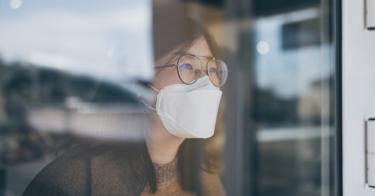Beijing’s harsh tactics for controlling the spread of COVID-19 during the Winter Olympics have shattered some athletes’ dreams and horrified much of the world, but they are life as usual in China. While some cling to the idea that China’s ”zero-tolerance” approach to the pandemic will be loosened after the Games, the only way the government has been successful in suppressing the spread of the coronavirus is through extreme measures. Chinese pride and the perceived legitimacy of the government are now tied to keeping the virus at bay at nearly all costs.
For example, most of the 13 million residents of the city of Xi’an spent almost the entire month of January confined to their homes in a citywide lockdown. Meanwhile, white-collar workers in cities such as Beijing and Shanghai have been abruptly locked inside their office buildings for days at a time after a single co-worker was identified as a close contact of a COVID patient.
Some in the U.S. business and policy communities mistakenly believe that China’s main purpose for maintaining its strict measures has been to ensure that the Olympics could be held in Beijing as scheduled, and that economic concerns will compel the government to relax these measures following the conclusion of the Games.
This view contrasts with the expectation of almost everyone in China. Contrary to the international community’s tendency to view the pandemic in economic terms, Beijing sees it mainly through the lens of politics. The Communist Party’s political interests are tied more than those of most governments to keeping COVID case numbers as low as possible.
>>> Staunch U.S. Ally Singapore Boasts World’s Freest Economy in Annual Heritage Foundation Rankings
Here’s why: The government’s response to the initial outbreak in Wuhan—in particular, the silencing of doctors who warned of the emergence of the new coronavirus—resulted in extreme social discontent. After one of the silenced doctors, Li Wenliang, died of the virus in February 2020, the result was arguably the greatest legitimacy crisis the Communist Party has faced since the 1989 Tiananmen Square crackdown.
After using harsh lockdowns to bring the initial outbreak under control, China’s leaders made a gargantuan propaganda push to juxtapose their efforts to stop the spread of the virus against the skyrocketing numbers of infections and deaths in the U.S. and other Western democracies.
Missing from the official narrative has been the extremely cruel nature of the lockdowns, which in some cases have prevented people from leaving their homes to buy food or even to receive critical medical care. In some neighborhoods, residents reported that local authorities had welded shut doors of apartment buildings, making it physically impossible to leave.
At first, these measures further infuriated Chinese citizens, but their successes at containing the outbreak enabled propagandists to flip the narrative and present the regime not as the source of the people’s grievances, but as their savior. From the ground in China, where I spent most of the first two years of the pandemic, I saw how, in a period of just two months, life had basically returned to normal for most people outside of a few designated high-risk areas.
The public anger had transformed into a sense of triumphalism, with the Communist Party and its leader, Xi Jinping, emerging from the crisis with more popular support than ever before. But a side effect of two years of this relentless messaging is that the Communist Party has inadvertently tied its claim to legitimacy to its ability to keep the coronavirus at bay.
That’s why Chinese authorities have gone to such great lengths to contain small, localized outbreaks in the lead-up to the Olympics. It’s also why no tickets have been sold to spectators and everyone participating in the Games is being kept isolated from the general public. Most important, it’s the main reason why Beijing is unlikely to relax its strict pandemic-control measures even after the Olympics.
If China were to relax restrictions, cases would soar, especially given the high transmissibility of the Omicron variant and the low efficacy of China’s domestically produced vaccines—the only ones approved for use in the country. Short of a significant decrease in COVID’s transmissibility and lethality, any fundamental policy change appears unlikely in the near term.
>>> There Is No Salvaging Congress’ Current Effort to Compete With China
This is especially true in the lead-up to the 20th Communist Party National Congress, set to occur later this year. Many local officials throughout China are seeking promotion and cannot afford to commit any blunders. This will incentivize provincial and municipal leaders throughout the country to maintain tried and tested zero-tolerance policies even if the central authorities do eventually permit some loosening.
This is not to say that China’s strict pandemic policies will remain in place indefinitely. Some virologists recently expressed cautious hope that the worldwide Omicron surge might result in sufficient immunity to move the virus into a manageable endemic phase.
Nevertheless, it’s too early to tell whether that will be the case. The pandemic could just as easily continue to rage, with new variants further prolonging the process. While most hope for a speedy end to the pandemic, they should be prepared for it to continue and for Beijing’s draconian approach to persist.
This piece originally appeared in The National Review



